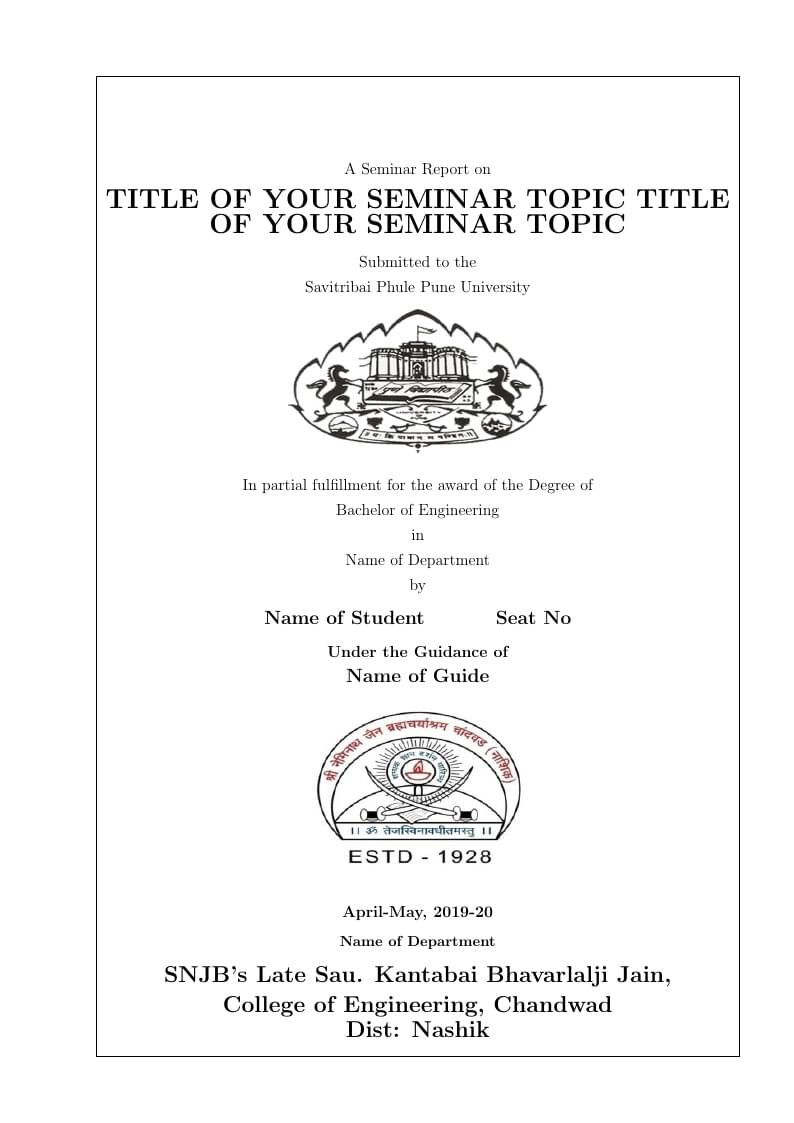
SNJB Seminar Template
Author:
Khyati R. Nirmal
Last Updated:
6 anni fa
License:
Creative Commons CC BY 4.0
Abstract:
Seminar Template for SNJB's LS KBJ COE

\begin
Discover why over 25 million people worldwide trust Overleaf with their work.
Seminar Template for SNJB's LS KBJ COE

\begin
Discover why over 25 million people worldwide trust Overleaf with their work.
\documentclass{SNJB}
\usepackage{babel}
\usepackage{babel}
\usepackage{algorithm}
\usepackage{algorithmic}
\usepackage{caption}
\usepackage{amssymb}
\usepackage{amsmath}
\usepackage{subfigure}
\usepackage{graphicx}
\usepackage{fancybox}
\usepackage{url}
\usepackage[breaklinks=true]{hyperref}
\usepackage[]{nomencl}
\renewcommand{\nomname}{Abbreviations}
\makenomenclature
\makeindex
\begin{document}
\title{Title of your Seminar Topic Title of your Seminar Topic}
\author{Name of Student}
\newauthor{K.R.Nirmal}
\new{Name of Student \hspace{1.5cm} Seat No}
\dept{Name of Department }
\supervisor{Name of Guide}
\submitdate{April-May, 2019-20}
\degree{Bachelor of Engineering}
\specialization{Name of Department}
\type{Seminar Report}
%\type{Seminar}
\hod{Name of Head of Dept}
\principal{Dr.M.D.Kokate}
\beforepreface
%\end{tabular}
\titleformat{\chapter}[display]
{\centering\normalfont\huge\bfseries}
{\chaptertitlename\ \thechapter}{20pt}{\Huge}
\thisfancyput(-0.0in,-10.0in){%
%\thisfancypage{%
%\setlength{\fboxrule}{1pt}\doublebox}{}
\setlength{\unitlength}{1in}\framebox(6.7,10.2)}
\prefacesection{Acknowledgement}
%\input{acknowledgement}
Purpose of acknowledgements page is to show appreciation to those who contributed in conducting
this dissertation work / other tasks and duties related to the report writing. Therefore when writing
acknowledgements page you should carefully consider everyone who helped during research process
and show appreciation in the order of relevance. In this regard it is suitable to show appreciation in
brief manner instead of using strong emotional phrases.\\
In this part of your work it is normal to use personal pronouns like “I, my, me” while in the rest of the
report this articulation is not recommended.Even when acknowledging family members and friends
make sure of using the wording of a relatively formal register. The list of the persons you should
acknowledged, includes guide (main and second), academic staff in your department, technical staff,
reviewers, companies, family and friends.
You should acknowledge all sources of funding. It’s usually specificnaming the person andthe type of
help you received. \\ For example, an advisor who helped you conceptualize the project, someone who
helped with the actual building or proceduresused to complete the project, someone who helped with
computer knowledge,someone who provided raw materials for the project, etc.
\acknowledgeauthor
\newpage
\thisfancyput(-0.0in,-10.0in){
%%\thisfancypage{%
%\setlength{\fboxrule}{1pt}\doublebox}{}
\setlength{\unitlength}{1in}\framebox(6.7,10.2)}
\prefacesection{Abstract}
\emph{Most difficult and important component of report/seminar is to write abstract. Presented at the
beginning of the report, it is likely the first substantive description of your work read by an external
examiner/reader. You should view it as an opportunity to set accurate expectations. The abstract is a
summary of the whole project work.
It presents all the major elements of your work in a highly condensed form. An abstract often
functions, together with the project title, as a stand-alone text. An abstract is not merely an
introduction in the sense of a preface, preamble, or advance organizer that prepares the reader for the
report.
In addition to that function, it must be capable of substituting for the whole report when there is
insufficient time and space for the full text.The final version of the abstract will need to be written
after you have finished reading your report for the last time. However, if you think about what it has
to contain, you realize that the abstract is really a summary of your project/seminar work.
Your abstract should answer specific questions: What was done? Why was it done?How was it
done? What was found? What is the significance of the findings?}
% Use following command at the command prompt to display the Abbreviations
% makeindex report.nlo -s nomencl.ist -o report.nls
%\newpage
%\addcontentsline{toc}{chapter}{List of Abbreviations}
%\printnomenclature
\newpage
\thisfancyput(-0.0in,-10.0in){%
%\thisfancypage{%
%\setlength{\fboxrule}{1pt}\doublebox}{}
\setlength{\unitlength}{1in}\framebox(6.7,10.2)}
\afterpreface
\newpage
\thisfancyput(-0.0in,-10.0in){%
%\thisfancypage{%
%\setlength{\fboxrule}{1pt}\doublebox}{}
\setlength{\unitlength}{1in}\framebox(6.7,10.2)}
\listoftables
\newpage
\thisfancyput(-0.0in,-10.0in){%
%\thisfancypage{%
%\setlength{\fboxrule}{1pt}\doublebox}{}
\setlength{\unitlength}{1in}\framebox(6.7,10.2)}
\listoffigures
%\input{glossary}
\clearpage
\pagenumbering{arabic}
\pagestyle{plain}
\pagestyle{fancy}
\titleformat{\chapter}[display]
{\flushright\normalfont\huge\bfseries}
{\chaptertitlename\ \thechapter}{20pt}{\Huge}
\chapter{Introduction to Project Topic}
\input{./intro}
\chapter{Literature Survey}
\input{./lits}
\chapter{Details of analytic work}
\input{./meth}
\chapter{Details of Experimental work }
\input{./srs}
%\newpage
\chapter{Conclusion }
\input{./conclusion}
\titleformat{\chapter}[display]
{\centering\normalfont\huge\bfseries}
{\chaptertitlename\ \thechapter}{20pt}{\Huge}
%\prefacesection{Conclusion }
%\chapter{Conclusion}
%\input{./conclusion}
%%%%%\appendix
%\input{appendix}
%\nocite{*}
\renewcommand{\bibname}{References}
\bibliographystyle{IEEEtran}
\bibliography{ref1}
%Use following command at the command prompt to display the Index
% makeindex thesis
%%%%%\newpage
%%%%%\addcontentsline{toc}{chapter}{Index}
%%%%%\printindex
\end{document}